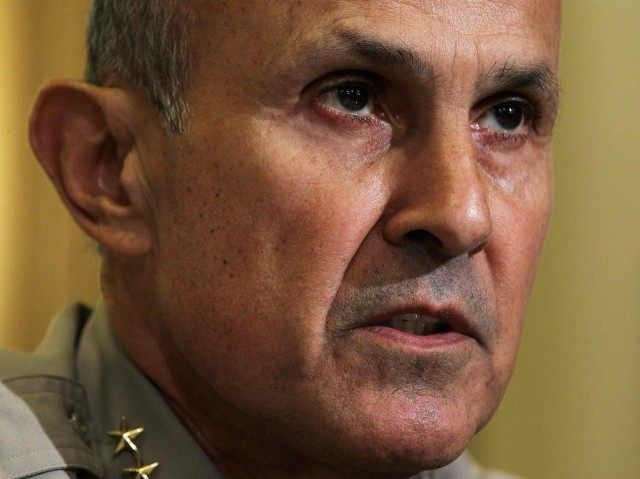A mistrial was declared in the trial of former Los Angeles County Sheriff Leroy “Lee” Baca, who was indicted for working to thwart an FBI criminal investigation into inmate abuse within his jails, after jurors told the federal judge they were “hopelessly deadlocked,” 11-1.
Baca was indicted on conspiracy and obstruction of justice charges that could have sent the 74-year-old — who is in the early stages of Alzheimer’s disease — to a long prison term. But U.S. District Judge Percy Anderson declared a mistrial and dismissed jurors on the afternoon of December 22 after they had deliberated for more than three days. One juror had held out for a conviction.
The mistrial is seen as a victory for Baca, who earlier this year agreed to a deal with federal prosecutors for the retired sheriff pleaded guilty to a single charge of making false statements to federal investigators and serving no more than six months in prison.
But Judge Anderson rejected the deal, calling it too lenient. Baca and his attorneys chose to withdraw his plea and the leader of the nation’s largest sheriff’s department for more than 15 years put his fate in the hands of a local jury of 12 citizens.
The 6-man, 6-woman jury were told by the prosecutors that Baca was the “heartbeat,” “leader,” and “driving force” of the conspiracy. But the government’s witnesses could not testify to direct criminal interactions with Baca during the time of the alleged interference with federal probe of his department. They finally told Judge Anderson there was “no reasonable probability” they’d reach a unanimous verdict, even if given more time.
Prosecutors alleged during the trial that Baca was resentful of the FBI’s efforts to investigate his jails and highlighted how Baca had told TV News that sheriff’s officials be able to “police ourselves.”
The U.S. Attorney’s Office has garnered convictions in the obstruction case against 9 former sheriff’s officials, including Baca’s second-in-command, Paul Tanaka, who was sentenced to 5 years in prison for obstructing a federal probe. Other deputies have been convicted of a number of civil rights violations in associated with jailhouse abuse.
Assistant U.S. Atty. Brandon Fox in his prosecutorial closing arguments claimed that Baca turned a blind eye and merely “gave lip service” to repeated warnings about violence and corruption in his jails. But Baca was enraged in the summer of 2011 when he learned that the FBI had launched a secret inquiry and bribed one of his deputies in an undercover sting to smuggle a cellphone into Men’s Central Jail.
Fox argued, according to the Los Angeles Times, that Baca wanted to “forget about the abused inmates, forget about the dirty deputies. Mr. Baca wanted to ensure that no outside law enforcement agency was going to police his jails.” The prosecutor alleged that Baca was at the center of the conspiracy carried out by his subordinates to hide information from an inmate working with the FBI, to manipulate potential witnesses, and to intimidate a federal agent by threatening her with arrest.
Baca’s attorneys agreed that the former sheriff was upset with federal officials for their unprofessionalism by keeping him in the dark about their operation, but it did not motivate him to impede the federal investigation. Defense attorneys pointed out that Baca could not have obstructed justice, since only undersheriff Paul Tanaka had the direct rank-and-file deputies to take steps to frustrate the FBI investigation.
Tanaka, at his own obstruction of justice trial earlier this year, tried to transfer all the blame on to Sheriff Baca. But jurors found his testimony unconvincing, and only deliberated for less than two hours before convicting him on all counts.
Baca, who had won reelection as County Sheriff three times by big pluralities, retired in 2014 at the height of the LA County Jail scandals.
The U.S. Attorneys’ Office now must determine if it wants to retry Baca, who is already facing a separate trial on accusations of making false statements to federal investigators.

COMMENTS
Please let us know if you're having issues with commenting.